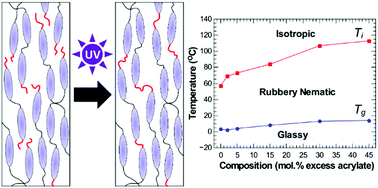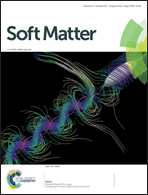Thermomechanical properties of monodomain nematic main-chain liquid crystal elastomers†
Abstract
Two-stage thiol-acrylate Michael addition reactions have proven useful in programming main-chain liquid crystal elastomers (LCEs). However, the influence of excess acrylate concentration, which is critical to monodomain programming, has not previously been examined with respect to thermomechanical properties in these two-stage LCEs. Previous studies of thiol-acrylate LCEs have focused on polydomain LCEs and/or variation of thiol crosslinking monomers or linear thiol monomers. This study guides the design of monodomain LCE actuators using the two-stage methodology by varying the concentration of mesogenic acrylate monomers from 2 mol% to 45 mol% in stoichiometric excess of thiol. The findings demonstrate a technique to tailor the isotropic transition temperature by 44 °C using identical starting monomers. In contrast to expectations, low amounts of excess acrylate showed excellent fixity (90.4 ± 2.9%), while high amounts of excess acrylate did not hinder actuation strain (87.3 ± 2.3%). Tensile stress–strain properties were influenced by excess acrylate. Linear elastic behavior was observed parallel to the director with modulus increasing from 1.4 to 6.1 MPa. The soft elastic plateau was observed perpendicular to the director with initial modulus and threshold stresses increasing from 0.6 MPa to 2.6 MPa and 14 kPa to 208 kPa, respectively. Overall, this study examines the influence of excess acrylate on mechanical properties of LCE actuators.

- This article is part of the themed collection: Liquid Crystal Elastomers


 Please wait while we load your content...
Please wait while we load your content...
